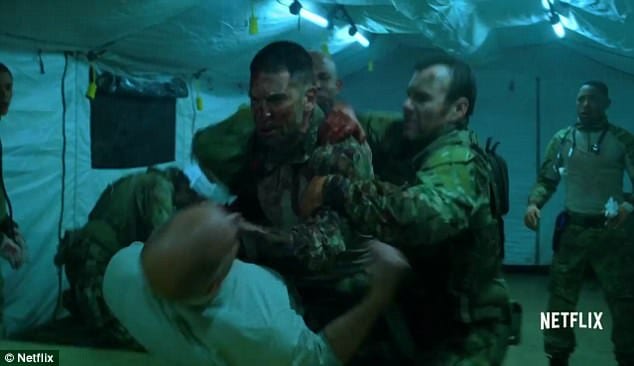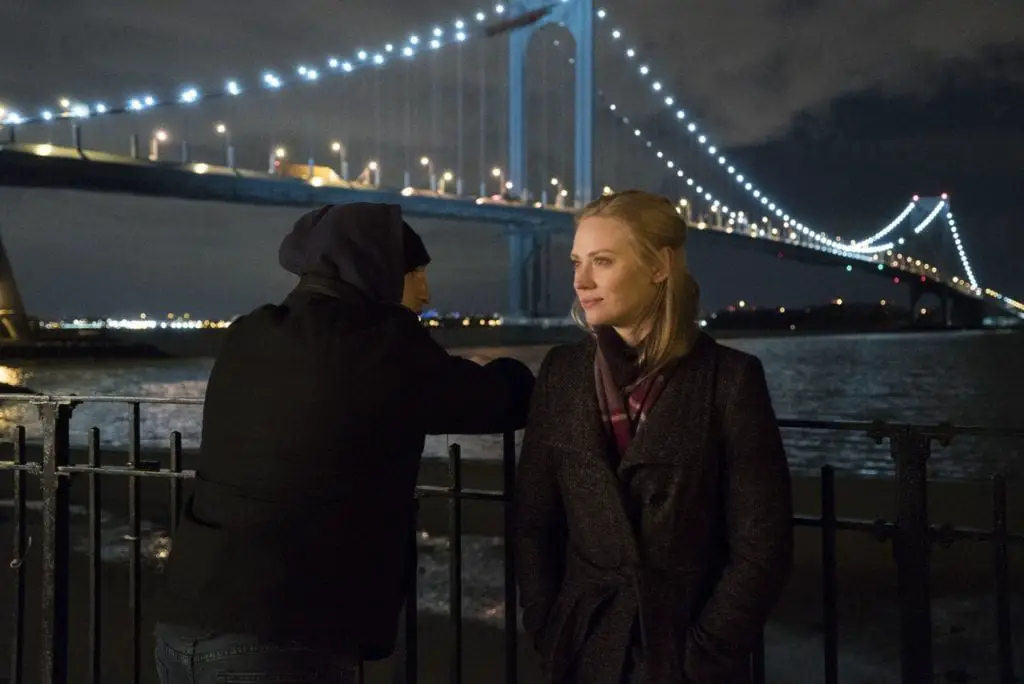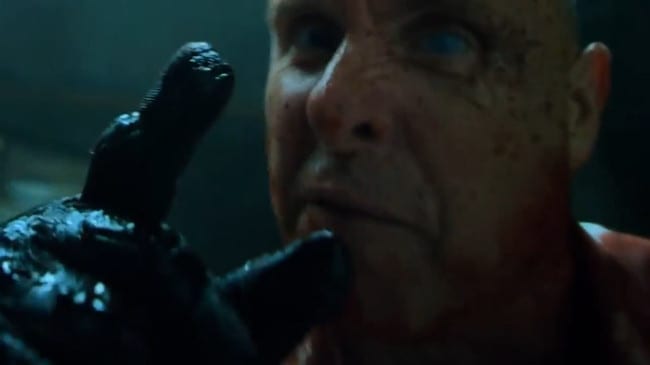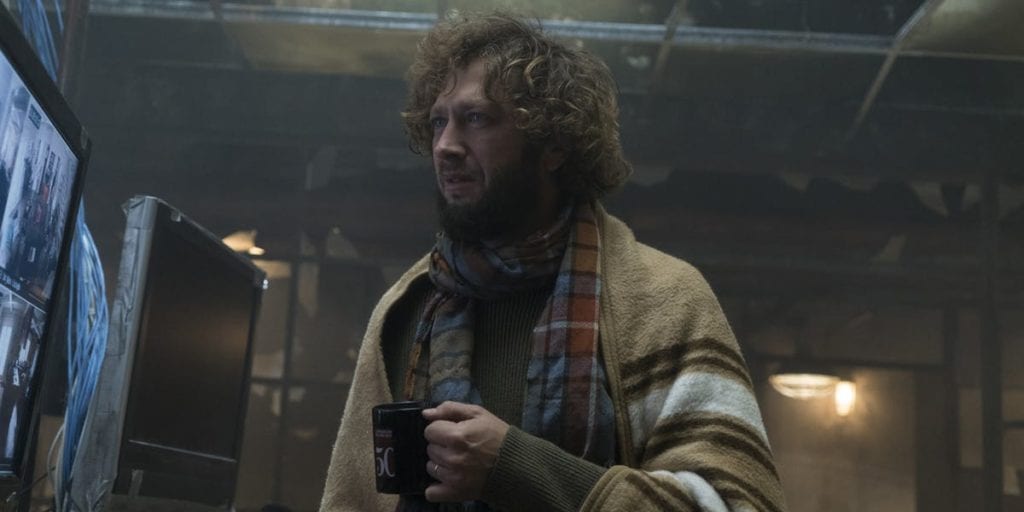Frank Castle, AKA The Punisher, is best known as a ruthless slaughterer of criminals big and small. He wields the arsenal of a small army to shoot, stab, and blow up anyone who breaks the law. He’s best known for the brutality of his kills and his complete lack of mercy. Sure, he has his own sort of code, and the death of his wife and children haunts him, but the reasoning tends to be second fiddle to the graphic deaths he is responsible for.
The first trailer for Netflix’s adaptation of the character played into this image of the character. It was filled with shootouts and promises of Castle’s ruthless brand of vigilant justice set to a soundtrack of “One” by Metallica. I was excited for this kind of show. Most Punisher fans were.
Then, unfortunately, real life tragedies occurred that dampened enthusiasm for the show we expected. The shooting massacres in Las Vegas and Sutherland Springs brought back the conversation of gun culture in America and how it plays into the absurd frequency of these kinds of mass killings. Needless to say, a show about a guy whose main hobby is mowing people down with a gigantic arsenal of guns couldn’t come at a worse time.
Marvel and Netflix seemed to agree, as a planned surprise release of the first season of The Punisher was delayed and given a proper release date. Even still, the delay only paused the question of whether this show was doomed by its content in the aftermath of two mass shootings. I was prepared to write an uncomfortable review focused on the horrible timing to release it.
This was even truer after the opening montage of Castle mowing down bad guys with “fuck yeah” music playing, and a title sequence showing a multitude of guns firing.
By the fourth episode, my expectations had changed drastically. The Punisher is not the show you expected, it’s not the show anyone feared, and it was all the better for it.

Now That the War is Through with Me
Turns out the first trailer did give away exactly what The Punisher would be, but not how most people thought. While everyone focused on how freaking cool it was to match the action to the music, the actual song chosen went overlooked. “One” by Metallica is inspired by the novel Johnny Got His Gun, a story of a soldier hit by an artillery shell and deprived of all four limbs and his entire face, as well as practically all his senses. It’s a story about the horrors of war and how they change a person permanently.
Which, basically, is the entire theme of The Punisher. This is a story of coming home from war and trying to assimilate back into a society.
Every single main character fits into this mold in some way. Frank, of course, is a veteran of Afghanistan whose life back home was ruined by his family’s murder. His best friend, Curtis, lost a limb to war. His main adversaries, fellow squad mate Billy Russo and their commander William Rawlins, are both veterans of war. So is another adversary for a subplot, Lewis Wilson. Frank’s partner, Micro, did not fight in a war but was intelligence. Homeland Security agent Dinah Madani was intelligence in the field.
Each and every one of these characters provides a different perspective of dealing with returning home. The result is a surprisingly sensitive look at how the hell people deal with returning to society from just about every perspective you’d want. You have the soldiers who try to keep fighting the war, soldiers who move on, the ones who feel betrayed and the ones who make successes of their lives. Some try desperately to forget the injustices of war, while others refuse to let go of them.
Nowhere is this examination more successful than with Frank Castle himself. To be clear, he’s still The Punisher. He’s still a ruthless murderer. He has no mercy for criminals and that never changes. His murders are cold and brutal. However, despite the hero shots of the opening and his “triumphant” victory at the end, Frank Castle’s actions are never glorified. They are called out for what they are, the horrific actions of a dangerous, bad person.
And even better, the show avoids painting him as a perfect person before the murder of his family. What we learn of his family life only adds to the unpleasant picture painted of Castle. His marriage was the rushed result of him getting his wife pregnant. He puts his hands on his son. Clearly they loved each other, and it was portrayed as a close family that loved each other, but it wasn’t like the Punisher was some sudden switch Castle never showed hints towards.
Most people expected Jon Bernthal to make the most of this character, and he sure as hell does, but it helps when the character gives him so much to work with. Frank Castle is a complicated, damaged, immoral man lashing out in pain at the rest of the world. He never came home from war, and it is this aspect of his personality The Punisher focuses on above all else.
Every other character serves as a mirror reflecting aspects of Castle’s personality and motives. Micro has practically the exact same family, except he “died” to keep them safe where Castle lost his. Frank’s interactions with said family inform on his interactions with the one he lost. Dinah has the same single-minded obsession with justice for the death of someone close. Lewis Wilson reflects what might happen if Castle’s deadly skills were turned on society.
There are plenty of issues plot-wise, but one thing The Punisher excels at is comparing and contrasting its characters and how they serve the same main themes.
Those themes are also touched on with a surprising deftness, even if the vehicles delivering them are somewhat bland and unoriginal. By showing so many differing perspectives, the result is a surprisingly comprehensive overview of veterans and how society treats them.
So what about the issue of violence? The thing people worried about most? Well, I won’t pretend the show completely avoids “cool” violence. It is the Punisher, after all. For everything the season does to speak against Frank’s crusade, his eventual revenge is completely over-the-top gruesome and treated as a triumph. He also pays no real consequences for everything he does throughout the season. By the time it happens, though, I think enough has been done to excuse it. Not to mention there are very few fights. They really don’t matter or get much play compared to the attempts to actually discuss something important.
The result is a surprisingly thoughtful show very few people expected.
Even better is how the plot manages to tie so many different perspectives and characters together in a natural way. The way everyone ends up in the same location for the resolution of Lewis’s plotline was awesome and the result made for one of the best episodes of the season. Whether directly or indirectly, time and time again Punisher surprised me with the soft, skilled touch of its characters and plot.
It was all the more surprising because of how blunt and predictable it all is.

Same Old Marvel
For all The Punisher does right, though, it has the same kinds of problems you’d come to expect of Netflix’s Marvel shows at this point. There is not enough story for thirteen episodes. The plot doesn’t make sense at some key moments. Law enforcement is laughably inept. While the acting is mostly solid and has a few excellent standouts, it isn’t anything special.
The biggest problem (at least for me) was how bland and cliché so many characters ended up being. Honestly, it’s a triumph that The Punisher manages to be as good as it is when no one outside of Frank Castle, Micro, and Karen Page prove the least bit interesting. Everyone else tends to be walking blocks of stock-issue sentences and reactions.
You know who the bad guy will be right away because you’ve seen this bad guy a hundred times before. You know what Dinah’s partner will say in every scenario. Two characters will obviously have sex based on the first time they talk to each other. As a result The Punisher is a wholly predictable show, to a fault. I honestly can’t think of a single moment in the season that surprised me.
This problem also made it difficult for me to really connect to any of the characters. Now, of course, others won’t have that problem. I’ve seen my share of complaints about The Punisher being boring, though, and often because of specifically this issue. When a show focuses so hard on examining the lives of its characters, you need to make sure the audience engages with them. The Punisher is hit or miss in that regard.
That’s not to suggest the characters are unlikable; I think they mostly come across just fine. Karen is still awesome, and Micro definitely lives up to the task of being a believable companion to Castle. Most the characters are fine. They’re just not that interesting.

When they rely so deeply on clichés to the point of complete lack of surprise, though, you’ll have problems. Of course there’s the episode where the hero spends most of it recovering from severe injuries, and you’ll probably groan through parts of it. Of course there’s another episode where a doctor “explains” life-threatening injuries while operating on the hero.
It is what it is. Some will forgive predictability more than others.
It’s also a problem when much of the plot depends on clichés, and not good ones. A huge part of the season involves the politics between federal agencies and political figures, and once again all of it depends on story beats you see coming from a mile away. Not in a good way, either, but because you know these plot points. You’ve seen them too many times before.
I suppose this isn’t inherently a problem, but it is when it makes everyone involved look completely incompetent. While Dinah isn’t the most interesting character in the world, there is something endearing about how often she fails. By the end of the season she reaches a point where I almost wanted to do a Kate Kane-style fail counter. The poor woman tries her best.
Unfortunately, she also reaches a point where her continued career is completely implausible. What federal agency would let someone continue who doesn’t follow orders, keeps secrets, gets people killed after falsifying intelligence, and lets dangerous vigilantes remain free? This issue extends to the government as a whole. What agencies talk to each other like this? Who the hell hears a subordinate admit to heinous war crimes and does nothing? How can Dinah talk like she does to people at the top of the CIA without consequence?
A few instances spread out might be believable. When this kind of absurd “politics” is the rule of the show, you can’t help but notice and focus on the flaws.
At this point inept law enforcement is the standard on Marvel shows, but most of them know better than to focus on law enforcement for that very reason. Homeland Security, the CIA, and the police are central to everything that happens on The Punisher. It’s a shame they weren’t handled better. I can handle a bit of incompetence and stretching of realism, but not this much.
I mean, besides everything Dinah does without somehow killing her career, there’s a point where Homeland Security purposely opens fire on a friendly character wearing a small square of Kevlar in order to fake his death. The sheer incredulity of a federal agency doing that just blows my mind.
So How Does it Compare?
That’s the question, right? The downward trend of the Marvel Netflix shows made many people skeptical who were not when The Punisher was first announced. Luke Cage had promise but ultimately fell off a cliff. Iron Fist was plain awful. The Defenders mostly delivered on entertaining character interactions, but had a god-awful plot cementing the Hand as narcolepsy-inducing pieces of cardboard.
Could The Punisher return to the kind of quality seen in Daredevil and Jessica Jones?
Short answer: yes. This show absolutely belongs up there with those two standouts. In fact, it reminds me a lot of Jessica Jones despite the differences in content.

Now, I’m not arguing The Punisher equals Jessica Jones. It doesn’t. The writing isn’t as sharp, it stubbornly follows tropes where Jessica Jones subverts them, and the overall message isn’t as fresh and underrepresented. However, it is precisely the message that ties them. Not in the content of their messages, but the way both shows were clearly crafted around a social issue and tie everything back to it, and tied their main characters directly to those issues.
Where Jessica Jones took the subjects of physical and psychological abuse and thoroughly explored the subject, The Punisher tries to do the same with veterans and subjects related to their returns to society. Everything about the show starts off this premise. Every character, every subplot, and ever plot point. Why does Lewis Wilson exist? Because he shows how a disgruntled veteran and those who share his sympathies are vulnerable to radicalization. The same holds true of every aspect of this show.
This stubborn focus on its messages elevates The Punisher above the sum of its parts. I walked away thinking better of the show because of the effort put forth into truly saying something. Too many shows fail to really do say anything. They’ll touch upon subjects but never go deep into them. Daredevil’s second season might want to have a debate about vigilantism, and certainly dedicates ample time to the subject, but it isn’t the point of the show.
Of course, that’s not to say a message alone means your show is better than one lacking. I wouldn’t say any one idea or message drives Daredevil’s first season, but it still ranks as arguably the best season of the Marvel Netflix shows. Still, when a show truly dives into something, it can punch above its weight.
I think The Punisher managed to punch above the weight of the acting, pace, and plot.
Perhaps others will disagree with me, but I appreciate when a show approaches a controversial debate with subtlety or moral certainty. Gun control is not sexual abuse. It is not a clear cut moral issue with an obvious good side to take. Neither is the subject of veterans reintegrating into society or the issues facing them. Every country has veterans. How do you deal with the men and women who come back from war changed? How do you help them?
There is no easy answer. Every veteran has their own experience that affected them differently than even someone they fought alongside. What helps one does not help another. Curtis’s help group existed for this reason. Through him we saw how three separate characters reacted to the idea of therapy. All three had separate feelings.
The Punisher actually holds a conversation within these thirteen episodes. You can argue about the effectiveness, for sure. It absolutely doesn’t cover its subjects the way Jessica Jones did, or Luke Cage tackled Harlem in the first half of its first season. It does hold this conversation, though, and does so well.
Do they do the same for gun control? The issue everyone worried about before release? Eh, that’s debatable. One episode has a strong scene featuring Karen Page on a radio show talking gun control with a stock-issue liberal politician that offers both sides of the argument. Like most things on The Punisher, the debate hits expected points without much new to offer. Unfortunately, the perspectives fall well short compared to the focus on veterans. Before and afterwards, they offer very little on gun control.
Should they have done more? Maybe, but I don’t think we should ever expect The Punisher to tackle gun control too far one way or the other. Not because of fear, but because guns are simply too central to the character.
Bottom Line
For those who hoped The Punisher would edge Marvel Netflix back towards the quality of Daredevil and Jessica Jones, I think it did so.
The Punisher has a consistent quality we haven’t seen since Jessica Jones. Every show since has had obvious pitfalls dragging the season down. Daredevil floundered when the Elektra/Hand plot took precedence over the Frank Castle plot. Luke Cage suffered immensely after Cottonmouth’s death. The Defenders made a huge mistake sinking its second half. Iron Fist was…well, horrible.
None of these shows fully committed to what they wanted those seasons to be. For better or worse, The Punisher knew what it wanted to be right away. On one hand, that means that if you don’t enjoy the first few episodes, your opinion likely won’t change. I think it made for a better show.
Fear not, everyone. The Punisher was a good first step back towards the promise of Marvel’s television efforts. It tried to be something different and more than the expectations ahead of time. I think they succeeded.

